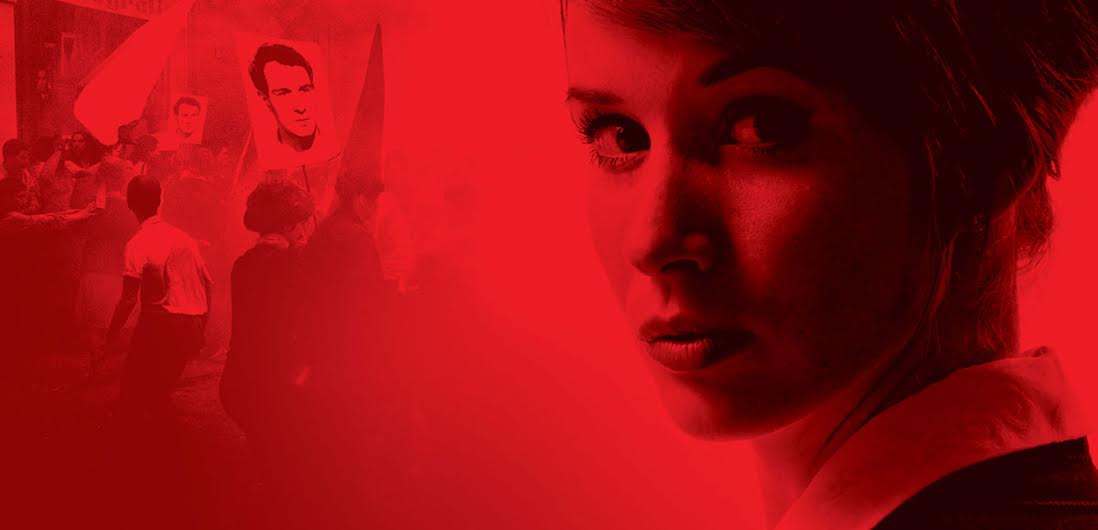The film “Burning Bush,” directed by Agniezka Holland, immediately grabs the attention of the audience with the site of a man drenching himself in gasoline and lighting himself on fire. As this mysterious man runs around after being enflamed, another man tries to stop his suffering by putting the flames out with a coat. The burnt man protests “leave me alone,” and that he did not attempt “suicide.” An ambulance arrives on the scene and the man is quickly put on a gurney, but before he could leave, he tells someone about his suitcase.
The suitcase contains a letter stating that the man who set himself on fire committed this act to make a point. He states that he and his colleague have demands that they want to be met. If the demands are not met, more people will set themselves on fire. One of these demands is to end censorship as he called himself the first torch. It is later determined that the burnt man is named Jan Palach, a student who is protesting during the time when Russia had invaded Czechoslovakia.
The film takes place in 1969 and Palach’s death is being investigated by the Czech police, who are trying to determine who Palach’s colleges are to try and stop them from hurting themselves. The police inform Palach’s brother (played by Petr Stach) that Palach is in the burn ward and he rushes to tell their mother what has happened.
The scene changed and Palach’s mother (played by Jaroslava Pokorná) is getting on a train heading to see Palach but is thrown into terror when she sees her son is injured from reading a newspaper article. Both Palach’s brother and mother go to see him but can barely handle the site of their loved one’s burnt body.
Czech police find out from Palach’s friend’s that he had a love interest named Hana Čížková (played by Emma Smetana). Police officer Jireš (played by Ivan Trojan) convinces Čížková to go on air and make a false statement that Palach wanted his followers not to hurt themselves. Then when Čížková was done with her statement on the air, Jireš pulls her aside and threatens her not to tell the truth about the false announcement.
Palach passed but his noble act was still remembered and his death started to receive more attention; students put a mold of his face in a building to show they cherish his courage, mourners go to Palach’s mothers house to support her and many people bring flowers to Palach’s grave.
Four weeks after Palach’s death, Vilém Nový (played by Martin Huba) a member of the Communist Party, is quoted saying that Jan Palach was crazy for setting himself on fire. Palach’s mother sees all the malicious lies Nový has said about her son in the newspaper and wants to sue him. She asked an attorney Dagmar Burešová (played by Tatiana Pauhofová) to represent her. At this time Burešová refuses to represent her and part one of three ends.
Part two of “Burning Bush” begins with tanks roaming the streets and several corpses lying in the there. Five weeks after Palach’s death, a boy locked himself in the bathroom. The boy rubs a gel like substance onto his body, chugs a bottle of hydraulic acid, and sets himself on fire. This boy is named Jim Zaijc and he leave a letter to the citizens of the Czechoslovakia Republic that read that he was the second torch.
The film moves to Burešová and her husband sitting and drinking wine together. She tells her husband that she has decided to represent Palach’s mother.
Burešová pushes the judge that is working on her case to get Novy to come to court but the judge tells her that she tries to sever him papers but he is never home. Burešová gets the address of Nový’s home from the judge and tricks Nový into accepting the lawsuit papers.
Palach’s mother sleeps but is awoken to the phone ringing with no one on the other end. She looked outside and noticed men sitting in a parked car watching her. The next day, Palach’s mother notices a magazine filled with pictures of her burnt son’s body.
Months have passed civilians are getting beaten in the streets by soldiers and barely making it away safely. Part two ends as Burešová stares out the window of her house watching the parked.
This film is based on true events and makes its audience members feel as if they were in 1969 and enduring the brutality that is going on in Prague, Czechoslovakia during this time. The director does an astounding job of keeping the setting gloomy, dark and desolate.
The film transforms certain scenes to black and white to demonstrate the seriousness of that moment in the film. The director made it clear to the audience that not only were the main characters suffering in the film but also the citizens, by showing innocent people getting beaten in the streets, students being incarcerated and the pain portrayed clearly on people’s faces.
Sonoma State student Julie Aldag said “Like most films at SFI, the ‘Burning Bush’ left you guessing what would happen. I enjoyed as always, and am encouraged to see part three to find out what will happen next.”
Fellow movie goer Lin Marie deVincent said “BURNING BUSH, directed by Czech filmmaker Agnieszka Holland, is a rare combination of the personal and political. I felt the grief and isolation of the true to life characters, and grateful to the Sonoma Film Institute for giving me the opportunity to see it.



































